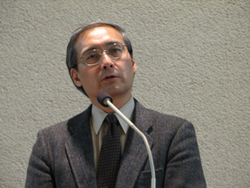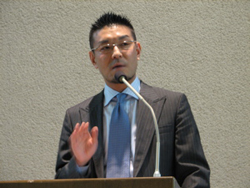Center for Interdisciplinary Study of Monotheistic Religions(CISMOR)Doshisha University
> Public Lectures > Religious Factors in the 2008 US Presidential ElectionPublic Lectures
Public Lecture
Religious Factors in the 2008 US Presidential Election
| Date: |
2009/01/31 13:00-15:00 |
|---|---|
| Place: | Chapel in the Divinity Hall, Doshisha Univ. |
| Lecture: |
Lecture 1 Religion in the 2008 US Presidential Election Lecture Fumiaki Kubo (Professor, The University of Tokyo) Lecturer 2 The Changing Landscape of Politics and Religion in America: New Trends in the Evangelical Community Lecture Toshihiro Nakayama (Professor, Tsuda College) |
| Summary: | |
|
Professor Fumiaki Kubo analyzed the influence of “religion in the 2008 US Presidential Election” from a macro point of view and presented the entire picture of the situation. The confrontation between the Republican Party and Democratic Party is often summarized as a small government vs. a big government, in terms of economic policy, and WASPs vs. non-WASPs, in terms of the support base. However, there is an important distinction between these two parties: one group is made of “secularists” who seldom go to church, while the other consists of “religious people” who are faithful to their religious belief. Analysis of the results of the national exit poll conducted by the New York Times in the last presidential election revealed the following facts. The Republican Party won almost twice as many votes as the Democratic Party from “white Protestants” (42% of all constituents) and slightly exceeded the Democratic Party in the number of votes from “white Catholics” (19%). An overwhelming majority of the votes of “Jews” (2%) went to the Democratic Party, while almost all “born-again Christians (those who experienced a religious rebirth) and Evangelical Christians” (38%) and “people who go to church at least once a week” (40%) voted for the Republican Party. From these figures, it is evident that the Democratic Party and the Republican Party conflict with each other on religious terms. However, in the last presidential election, some unique factors can be pointed out that could not be seen in past elections. For example, the Democratic Party won slightly more votes from religious people in this election than in the past, and competed well in this category of voters. Additionally, we could see an increase in the number of young white Evangelists who voted for the Democratic Party. However, it is too naive to conclude that these facts directly indicate a lessening of the religious confrontation, considering that the economy was the main issue of the last presidential election. Yet, President Obama selected a religious leader with a controversial background to deliver a prayer at his presidential inauguration and adopted new policies to reduce the number of abortions, which appears to indicate that the President is willing to settle the religious confrontation. Associate Professor Toshihiro Nakayama analyzed the new trends in the Evangelical community seen in the last presidential election and argued that the relationship between government and religion has begun to change. The central issue of the last presidential election was the economy, and the religious issue was pushed back, in general. However, this does not mean that the “God gap” between Republicans and Democrats was closed. In fact, a majority of religious votes went to Republicans, as they did in the past. The Democratic Party was highly aware of the necessity of highlighting the religious issue to win the presidential election. Sometimes called a “born-again liberal,” Barack Hussein Obama could speak about his own religious belief quite naturally, unlike conventional liberals who keep themselves distant from religion, and actually, he talked about the diversity of religious beliefs. This was Obama’s strength. In contrast, John McCain, the Republican candidate for president, failed to garner full support from Evangelicals. Consequently, the importance of religious votes in the last presidential election was relativized. If we are to understand the background to such a change, we should study the new trends that are emerging in the Evangelical community. One of such trends is the retirement of the first-generation Evangelical leaders, who lost influence due to aging or who have passed away. Consequently, the second-generation leaders and young Evangelicals, who felt sympathy for them, have grown interested in issues not addressed by the first-generation leaders, such as poverty, AIDS, the humanitarian crisis in Africa, and global environmental problems. While these Evangelicals remain opposed to abortion, they are also aware that the Evangelical teaching is often criticized for its extreme “intolerance” and “exclusivity,” and this awareness has made them determined to keep their “pro-life” stance in a more comprehensive manner. According to Associate Professor Nakayama, such awareness among the new-generation Evangelicals, regrettably, does not seem to generate enough power to change the U.S. government, because these Evangelicals are not interested much in political power. Rather, they appear to want to keep some distance from political activities. However, if such awareness continues to grow, he argues, close relationships may no longer be fostered between a particular political party and a powerful religious group. Ryuji Fujimoto (Research Fellow, CISMOR, Doshisha University) |
|
|
Handout |
|

